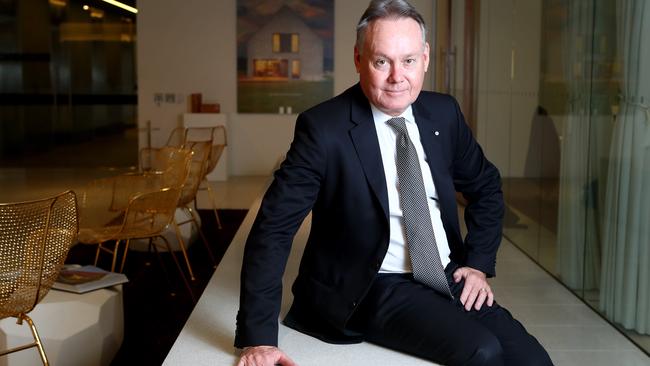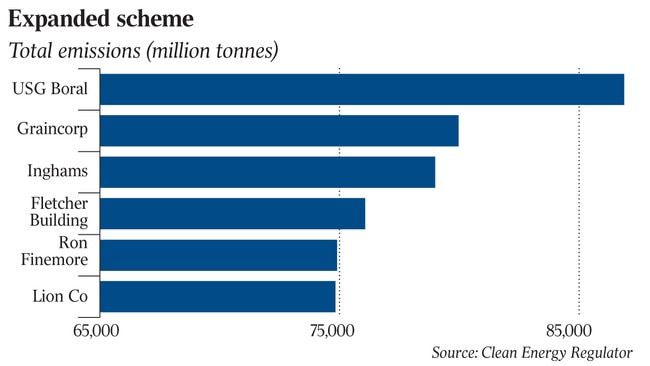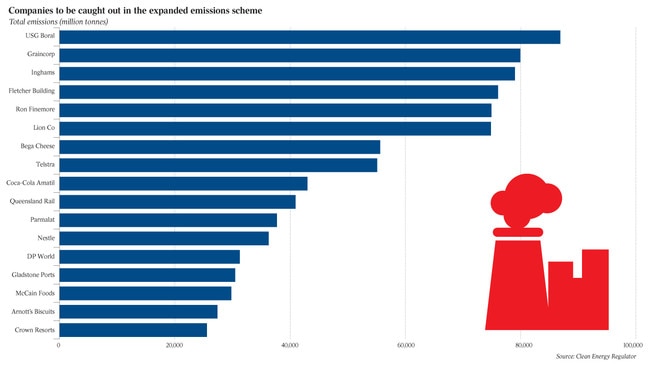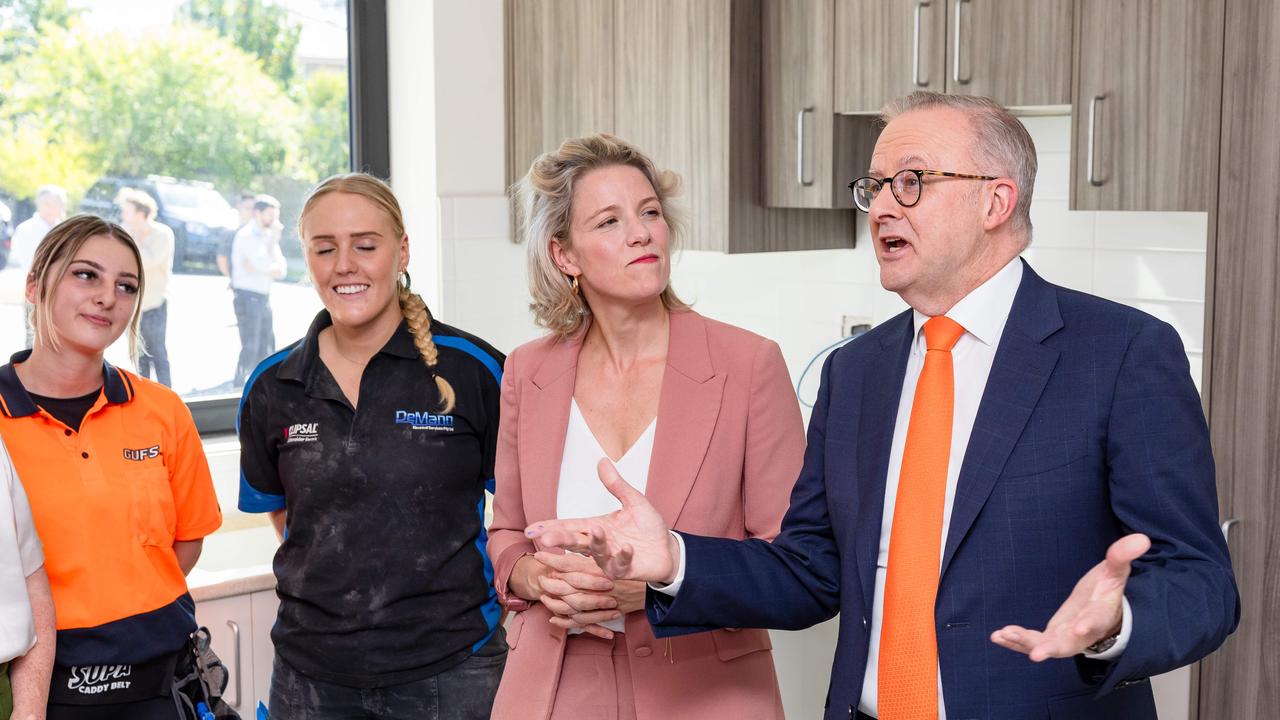Labor’s carbon net traps business
Australia’s biggest building materials companies and food manufacturers could be caught up in Labor’s policy.

Some of Australia’s biggest building materials companies and food manufacturers could be caught up in Labor’s policy to expand the Coalition’s carbon plan by lowering the threshold for inclusion from 100,000 tonnes of carbon emissions a year to 25,000 tonnes.
Telstra, Fletcher Building, Crown Resorts, Coca-Cola Amatil and Bega Cheese are among emitters that may be affected, along with Brickworks, Santos, Qantas, Virgin Australia, Linfox and Glencore, with the number of companies captured under the mechanism increasing from 140 to 250.
Other names include key food producers GrainCorp, Inghams, Lion, McCain Foods, Arnott’s Biscuits, Nestle and Parmalat.
Australia’s largest brickmaker, Brickworks, has slammed Labor’s emissions plan as a new carbon tax on big business and warned the move could force manufacturers to shift operations overseas.
Brickworks chief executive Lindsay Partridge told The Australian the move would make it more difficult for manufacturers and heavy industry to compete and could result in operations being pushed offshore.
“It looks like a carbon tax to me,” said Mr Partridge, who was a vocal critic of Labor’s original carbon tax in 2012.
“The carbon tax when it was in place cost us $1 a gigajoule in gas and since then the price of gas has tripled. All Labor is going to do is send more manufacturing offshore.”
Brickworks expects its Wollert facility in Melbourne and a Sydney plant would be likely to fall under Labor’s proposed policy.
“We have two of the most efficient kilns anywhere in the world and they are facing being taxed.
“I don’t understand the logic,” Mr Partridge said.
“We are only a month or so from the election, but they have had five years to develop a policy. So we will now wait for the detail.”

Bill Shorten pledged a Labor government would consult with industry and business about a time frame for phasing in the new cap on the safeguard mechanism, with concessions for energy-intensive trade-exposed industries.
One of Australia’s largest energy producers, Santos, is understood to be in line for some of its operations to receive an exemption and warned costs incurred will hinge on its final design.
“Labor has committed to consultation with industry because the design and implementation of emissions reduction schemes is not an easy task, as the last 12 years in Australia has very clearly demonstrated,” Santos chief executive Kevin Gallagher told The Australian.
“With the reduction in the threshold for coverage by the Safeguard Mechanism, some additional facilities will come into the scheme and therefore require baselines to be established and reported against.
“Importantly, Labor has committed to consultation with industry on design of its emissions reduction scheme, baselines and trajectories.”

Rival Woodside Petroleum said it wanted to see a economy-wide carbon price.
“What we need is lowest-cost opportunities to reduce carbon, and different sectors of the economy have different opportunities to do so: it’s expensive for the LNG industry but cheap for electricity generators, so the power sector should do more,” a Woodside spokesperson said.
The industry body for oil and gas in Australia, APPEA, said the treatment of LNG would be closely scrutinised by its members.
“The proposal to adopt a ‘comparative impact’ principle could be an effective way to recognise the competitive challenges facing trade-exposed industries because very few of Australia’s LNG competitors face carbon pricing mechanisms,” APPEA said.
Qantas said both business and governments need to do more to tackle climate change while Virgin said it was committed to working with Canberra to reduce carbon emissions.
“Qantas is working towards global targets adopted by the aviation industry as a whole to reduce emissions. We also have the largest carbon offset scheme of any airline in the world,” a Qantas spokesman said. “We support targets that are ambitious as well as achievable and we recognise governments and businesses need to do more to tackle climate change.”
Logistics giant Toll said it would work with Labor “if elected to find a solution to reduce emissions at least cost, while balancing the need to sustain a viable transport industry that underpins our economy”.
The Ai Group, which represents heavy industry, said it represented a “heavy lift” for many parts of the Australian economy.
It “would be workable only if they were delivered in tandem with commitments to avoid trade distortions, allow many sources of flexibility and facilitate major low-carbon investments,” Ai Group chief executive Innes Willox said.
“We should not underestimate how difficult the trade-offs would be between the expectations of different industries and other stakeholders. Close consultation with the breadth of affected industries would be essential to deliver on such ambitious goals.”
Mr Shorten said Labor would help energy-intensive, trade-exposed industries, such as aluminium, to meet their obligations with a $300m reserve fund under the banner of a “strategic industries taskforce” to ensure they remained competitive.
The electricity market would be exempt from the expanded safeguard mechanism, with Labor exploring the option of allowing businesses to purchase renewable energy offsets generated from the electricity sector.
However, it would be covered by the Coalition’s shelved national energy guarantee, which Labor would revive in its bid to decarbonise the electricity sector.





To join the conversation, please log in. Don't have an account? Register
Join the conversation, you are commenting as Logout